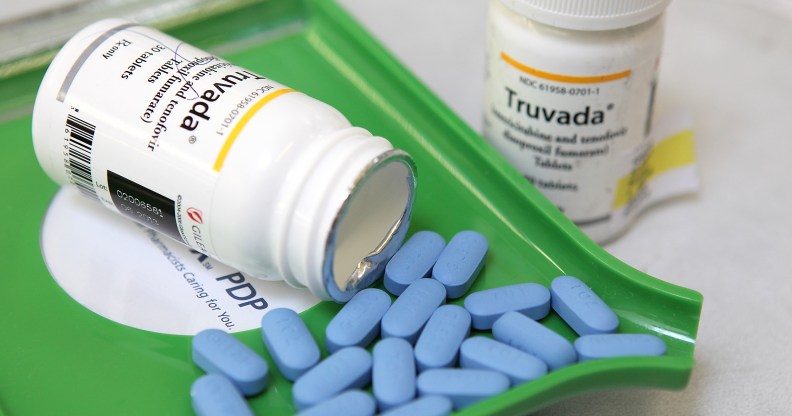More than 70 countries risk running out of HIV drugs due to the COVID-19 pandemic, World Health Organization warns

Bottles of antiretroviral drug Truvada. (Justin Sullivan/Getty)
Seventy-three countries fear they could run out of antiretroviral (ARV) medications, which prevent the transmission of HIV, because of the coronavirus pandemic, according to the World Health Organization (WHO).
A new WHO survey released ahead of the biannual International AIDS Society’s conference found that 24 countries currently had either supply problems or critically low stocks of the anti-HIV medications because of COVID-19.
In the 24 countries experiencing shortages, around 8.3 million people are using ARV medications.
Suppliers failing to deliver the medication, shut downs of air and land transport and limited access to healthcare services were listed as reasons for short supply in the survey.
WHO director-general Dr Tedros Adhanom Ghebreyesus said at the International AIDS Society’s press conference: “WHO is deeply concerned about the impact of COVID-19 on the global response to HIV… While tackling COVID-19 is a global priority we must not turn our backs on the 38 million people living with HIV and the millions more at risk of infection.
“Now is the time to redouble our efforts, build national unity and global solidarity to tackle both the coronavirus pandemic and diseases like HIV.”
According to data released by UNAIDS and WHO, antiretroviral drugs saved 15 million lives between 2000 and 2019.
A UNAIDS and WHO modelling exercise in May, 2020, predicted that six months of disruption in accessing the HIV drugs could lead to a doubling of AIDS-related deaths in sub-Saharan Africa in 2020 alone.
Ghebreyesus said: “The disruptions in access to life-saving commodities and services come at a critical moment as progress in the global response to HIV stalls.
“In 2018 and 2019, the number of new HIV infections stabilised at 1.7 million annually and there was only a modest reduction in AIDS-related deaths.
“Despite steady advances in scaling up HIV treatment coverage to more than 25 million people, the ’90-90-90′ targets set for 2020 will not be reached.
“Progress is stalling because HIV prevention and testing services are not reaching the groups that need them most.”
Those groups, he said, included “men who have sex with men, sex workers, transgender people, people who inject drugs and prisoners”.
He added that WHO has suggested all countries prescribe ARV medications for longer periods of time, up to six months, during the COVID-19 pandemic “while shoring up the supply chain for all medicines”.

